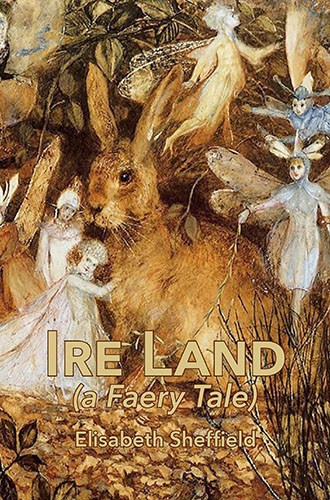Reviewed By Callie Richards

Sandra Dorn is dead. The only thing that could possibly explain how her passing came about is a series of emails she’d written to an online friend. The emails document the last nine months of Sandra’s life, revealing the ups and downs of an older woman who refuses to become a stereotypical old lady. Throughout her emails, Sandra reveals the struggles with her past, her identity, the desires that once fueled her, and the difference between reality and the fabrication of events within her mind.
Ire Land (a Faery Tale) is the fourth novel by Elisabeth Sheffield. It is an epistolary novel, told through email, chronicling the wild experiences of the last months of Sandra Dorn’s life. The reader is taken on Sandra’s journey through the eyes of her estranged daughter, McKew “Kew” Kambi. Kew was given the manuscript by an editor, four months after her mother’s passing. The editor will occasionally make interjections in the story by providing information that Sandra excluded, either purposefully or unintentionally. These interjections are often things that Kew wouldn’t know, due to her estrangement from her mother. The novel is comprised of lengthy emails Sandra sent to an online friend whose responses are not as invested as one would hope. To combat her sense of obsoletion and crippling loneliness, Sandra pours her heart into these emails. She shares, in excruciating detail and depth, her innermost thoughts, feelings, and details of her trials and tribulations. However, as the reader progresses through Sandra’s tale, the emails reveal that her perception of reality may not be entirely accurate.
Sheffield does an excellent job of blurring the lines between Sandra’s thoughts and opinions, and the reality she faces, as the emails progress closer and closer to Sandra’s death. Sheffield does not separate the dialogue from the events that surround them, further obscuring a clear separation between fact and fabrication. The “fairy tale” element of the story is heightened by Sandra’s loose grip on reality, creating a closing narrative that is just as complex and muddled as the rest of her life. Did the events of her last few emails actually happen, or was Sandra so absorbed in her own mind and opinions that she misinterpreted the world around her?
This loose grip on reality is further cemented by Sandra’s strong voice. Sheffield has a clear and consistent style that brings her protagonist to life. Throughout the novel, the reader can clearly understand that Sandra is trying to fight off irrelevancy. There’s a sense of desperation in the emails, along with a sense of gratitude. Sandra doesn’t really have any close connections, either with family or friends, and she only seems bothered by that now that she has fallen on hard times. Her only “true” connection is her email friend; the one who replies to Sandra with one sentence responses. Despite the lack of reciprocation, Sandra clings to her internet friend, sending her emails whenever she has the time, with a sense of joy and appreciation that she may not be completely alone. This loneliness permeates the story, with Sandra clinging to the life she once had, while combating her current state.
Sandra fights her fears of uselessness on a harrowing emotional and physical journey. Her emails correlate with the space she’s in, with the exception of one email that relates to her past. Her journey takes her from Colorado, to Washington State, New York, and Ireland (past and present). Each stop presents Sandra with a confrontation of who she once was, in contrast to the person she has become. In each location, Sandra reacquaints herself with family members, meeting their partners and friends. With each person she interacts with, Sandra is reminded of what she once had, and all she lost along the way. They represent the lives she could have had, and the world from which she is now an outcast. Sandra flits from location to location, searching for something to fulfill her, but she’s foiled at every turn. No matter who she is with, or how good things seem to be going for her, Sandra still feels empty. Her physical journey is directly tied to her emotional and mental journey, thoughts and emotions blurring with events and people. The direct correlation between location and mental state aids in her senses being distorted. Sandra’s narrative is complicated as she further proves that her grip on reality is not as solid as she believes it to be.
Sheffield does an excellent job of presenting a broken and struggling character trying to fight off an impending doom. Sandra’s story is tragic, though she doesn’t see it that way, which is masterfully portrayed in Ire Land (a Faery Tale). The consistent struggle Sandra faces is presented in a realistic and compelling way throughout the novel. Her inability to distinguish her imagination from reality plays into the downfall she’s desperately trying to escape. The world of fantasy is balanced and blended with the ordinary in a way that deepens the characterization of the protagonist, while maintaining the promise of the story being a “faery tale.”
